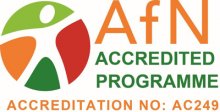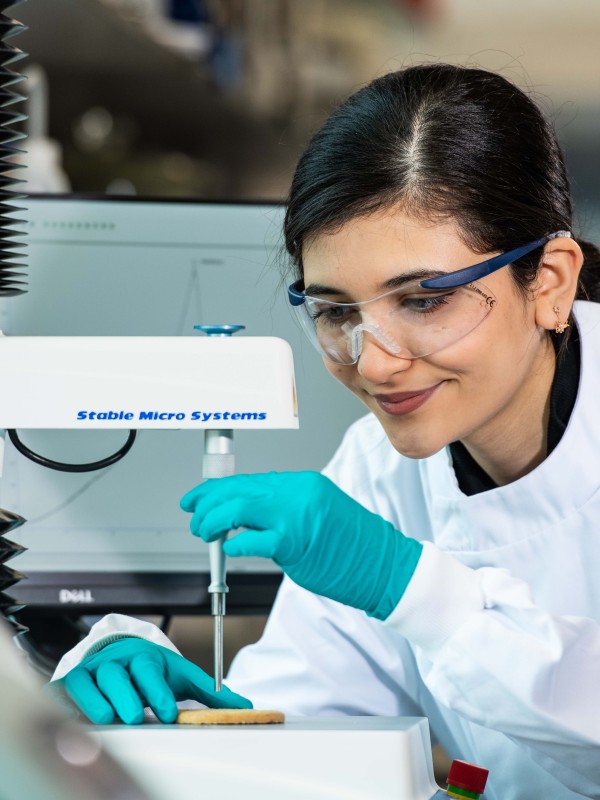
- Human Nutrition
MSc — 2025 entry Human Nutrition
On our Human Nutrition MSc, you'll study a research-led curriculum, including carrying out your own original research, and develop a deep understanding of current issues in the field of human nutrition.
Why choose
this course?
- Access our multimillion-pound biomedical laboratories, kitted out with the latest industry equipment, to measure rates of synthesis, disposal and conversion of metabolites.
- Learn from lecturers who have been awarded the Queen’s Anniversary Prize for Further and Higher Education in recognition of their research excellence in the field of food and nutrition.
- Join one of our research groups to take part in seminars and workshops, and benefit from our links with renowned research institutions across the world.
- Get the academic requirements needed to register with the Association for Nutrition (AfN) to work as an associate nutritionist once you’ve graduated.
Statistics
100%
Of our biosciences masters graduates are in employment or further study (Graduate Outcomes 2024, HESA)
12th in the UK
Surrey is ranked 12th in the UK in the Complete University Guide 2025
Accreditation

What you will study
You’ll investigate the evidence-based links between diet, health and disease, supported by a full appreciation for the nutritional mechanisms involved. You’ll develop your knowledge and scientific research skills to an advanced level, preparing you for a career in nutritional sciences.
You’ll study topics, including the fundamentals of human nutrition, international and public health nutrition, metabolic nutrition, molecular nutrition, and sports and exercise nutrition.
You’ll also undertake your own original research, and we’ll supervise you to carry out experiments and projects on important topics in the field. We’ll match your interests with the expertise of our researchers, ensuring you get the best support. You’ll also be part of ongoing research activity at Surrey.
Professional recognition
MSc - Association for Nutrition (AfN)
Accredited by the Association for Nutrition (AfN) for the purpose of eligibility for Direct Entry Registration at Associate Level with the UK Voluntary Register of Nutritionists (UKVRN).
Research groups
You’ll be invited to join one of our research groups focusing on metabolic medicine, food and macronutrients, and public health and food security. You’ll participate in discussions about research topics, findings and publications, and you’ll benefit from our links with renowned research institutions across the world.
We also have a host of external speakers that visit us and present their work, and a collection of seminars and workshops, allowing you to network with likeminded individuals.
Facilities
You’ll get access to our multimillion-pound biomedical laboratories, kitted out with the latest industry equipment. This includes our Stable Isotope-based Analysis Core Facility, where we use stable isotope tracers and mass spectrometry to measure rates of synthesis, disposal and conversion of metabolites.
The structure of our programmes follows clear educational aims that are tailored to each programme. These are all outlined in the programme specifications which include further details such as the learning outcomes:
Modules
Modules listed are indicative, reflecting the information available at the time of publication. Modules are subject to teaching availability, student demand and/or class size caps.
The University operates a credit framework for all taught programmes based on a 15-credit tariff, meaning all modules are comprised of multiples of 15 credits, up to a maximum of 120 credits.
Course options
Year 1
Semester 1
Core
This module is designed to equip students with the core knowledge of energy and the nutrients as a foundation to further nutrition modules within the MSc Nutrition programme. It will also develop key academic skills for learning, research and communication at an advanced level.
View full module detailsThis module is designed to give students exposure to the practical methods of dietary and nutritional status assessment. Many of these techniques are used in clinical nutrition, nutrition research, surveys and individual and population monitoring. By the end of this module students will be able to critically evaluate the use and appropriateness of assessment methods in a variety of settings
View full module detailsThis module examines the critical role of energy balance in the control of body weight, with focus on physiological mechanisms of appetite regulation, energy intake and expenditure in relation to weight gain and obesity. It evaluates the links between excess body fat and cardiovascular disease (CVD) and explains how these links result from adverse changes in lipid metabolism and the molecular physiology of adipose tissue. These topics are then addressed within the context of how diet and lifestyle can promote and protect against the development of CVD, with critical appraisal of the evidence for the specific impacts of weight-loss and dietary macronutrients.
View full module detailsThe module provides an overview of Nutrition Research Methodology with a specific focus on the examination of the various types of research designs used in nutrition research including observational, experimental and systematic reviews & meta-analyses. The main purpose of this module is to equip students with the tools needed to confidently undertake their own research, including research design, recruitment, power, analysis and ethical issues. By the end of this module all students will produce an original research protocol suitable to undertake as their own research project in MHUM009 following ethical approval (if applicable).
View full module detailsSemester 2
Core
The module develops the students’ understanding as to the translation of nutrition science into population health, policy and guidelines.¿ It gives a global perspective on nutrition related public health issues of current concern, and aims to develop critical thinking and application.¿ The module is taught by a combination of internal and guest lecturers providing insight from a national and international perspective
View full module detailsThis module explores the molecular and genetic basis of nutrients in health and disease. Taught by a collective expertise within the University’s School of Biosciences, students will be well equipped with the fundamentals of molecular biology and how this is applied to current research and understanding in nutrition. By the end of the module, students will be able to critically appraise topical research in this area and evaluate how new knowledge helps underpin current understanding of disease.
View full module detailsThis module focuses on the application of nutrition to sports and exercise. The module begins with an introduction to exercise physiology both theoretical and practical before exploring the role of energy and nutrients during exercise. Content is taught using a collection of in-house and external speakers. By the end of the module students will be confident in how to apply nutrition principles in a sport and exercise setting.
View full module detailsThis module focuses on developing the relationship between knowledge, professional skills and the practical application of working within a nutritionally related environment. The module will run over a period of four weeks, and the student is expected to attend the teaching and interactive sessions throughout the four week period. Students will be working together within teams and key communication skills and professionalism are key areas of development. This module is supported by a combination of direct teaching, as well as guided and independent learning. Students will be expected to liaise regularly with their peers and to contribute to group workshops equally. This module contains core Competency requirements to meet AfN requirements membership.
View full module detailsAcross academic years
Core
This module allows the student to engage in an in-depth major project in an area relevant for nutritional science in the 21st Century. Projects may involve direct data collection, analysis of pre-existing datasets or “big-data”, systematic reviews/meta-analysis or involve writing a research grant application to answer a pertinent nutritional question. Students may be attached to NHS units, to staff or research teams within the Department of Nutritional Sciences, but also in other areas in the wider University, including psychology. Students will be guided to undertake a project in an area of interest or in an area proposed by a University supervisor(s).
View full module detailsOptional modules for Year 1 (full-time) - FHEQ Level 7
Students must pass a minimum of 15 credits from Semester 1 and achieve an overall pass mark (50%) across all Semester 1 modules to progress to the Original Research Project (MHUM009)
Teaching and learning
You’ll be taught by experts who are active researchers in diabetes, lipid metabolism, cardiovascular risk, bone health, vitamin D, selenium and iodine, appetite and the gut, obesity, and exercise nutrition, ensuring everything you learn is up-to-date and relevant to employers.
You’ll also learn from lecturers who were awarded the Queen’s Anniversary Prize 2017-18 for Further and Higher Education, in recognition of their research excellence in the field of food and nutrition. These may include:
- Dr Adam Collins, a qualified nutritionist for over 20 years and an expert in obesity, weight loss, body composition and sports nutrition
- Dr Barbara Fielding, an expert in lipid metabolism and isotope tracers
- Professor Bruce Griffin, a qualified nutritionist and world-leading expert on the effects of diet on cardiometabolic risk
- Professor Margaret Rayman, an expert on the effects of selenium and iodine in pregnancy.
Your teaching will be delivered through a combination of:
- Group work (e.g. discussion groups)
- Laboratory-based practicals
- Lectures
- Online learning
- Presentations
- Tutorials.
Taught and practical sessions are scheduled across four days of the working week (Monday – Friday), with Wednesdays allocated for self-study. Outside of scheduled hours, you’ll be expected to carry out independent study, including coursework, essays, laboratory write-ups and reading.
Assessment
We use a variety of methods to assess you, including coursework, essays, examinations and presentations.
Check individual module information to see full details at a module level.
General course information
Contact hours
Contact hours can vary across our modules. Full details of the contact hours for each module are available from the University of Surrey's module catalogue. See the modules section for more information.
Timetable
Course timetables are normally available one month before the start of the semester.
New students will receive their personalised timetable in Welcome Week, and in subsequent semesters, two weeks prior to the start of semester.
Please note that while we make every effort to ensure that timetables are as student-friendly as possible, scheduled teaching can take place on any day of the week (Monday – Friday). Wednesday afternoons are normally reserved for sports and cultural activities. Part-time classes are normally scheduled on one or two days per week, details of which can be obtained from Academic Administration.
Location
This course is based at Stag Hill campus. Stag Hill is the University's main campus and where the majority of our courses are taught.
We offer careers information, advice and guidance to all students whilst studying with us, which is extended to our alumni for three years after leaving the University.
This course is accredited by the Association for Nutrition (AfN). This means you’ll be eligible to apply for direct entry into the UK Voluntary Register of Nutritionists to work as an associate nutritionist (ANutr) on successful completion of your studies. Once you’ve gained three years of post-degree professional experience, you’ll be eligible to apply for registered nutritionist status (RNutr). ANutr and RNutr nutritionists are the only evidence-based nutritionists recognised by NHS England, research and academia, the food industry, professional and elite sport, and most charities and non-government organisations in the UK and overseas.
100% of our biosciences masters graduates are in employment or further study (Graduate Outcomes 2024, HESA). Our alumni take on roles as nutritionists and healthcare assistants, working for NHS trusts, food production companies, Government departments, nutrition organisations, sports clubs and start-ups.
The skills you’ll gain are also highly relevant in other fields, including consultancy and pharmaceuticals. Many of our graduates go on to complete a PhD, investigating an area of personal interest.
Learn more about nutrition careers on the Association for Nutrition website.


Princess Chukwu
Student - Human Nutrition MSc
"My course has helped me critically analyse research, including the limitations surrounding food studies. Understanding the idea that nutrients don't exist as separate entities in food has been the greatest learning I’ve taken away."


Dr Akshay Alawani
Graduate - Human Nutrition MSc
"Since graduating, I’ve been working as a nutrition educator and doing nutrition consultancy. Soon, I’m planning on applying for a PhD, to contribute to the growth of nutritional science and teach. There’s still so much more to explore in nutrition and this truly excites me."
UK qualifications
A minimum of a 2:2 UK honours degree in anatomy, biology, biochemistry, biomedical sciences, biological sciences, biotechnology, chemistry, dietetics, forensic science, medicine, microbiology, nutrition, pharmacology, pharmacy, physiology or veterinary, or a recognised equivalent international qualification.
We'll also consider substantial relevant work experience if you don't meet these requirements.
Professional qualifications in medicine, dentistry or veterinary medicine can also be considered.
Not accepted: Food quality and safety or food science and engineering.
English language requirements
IELTS Academic: 6.5 overall with a minimum of 6.0 in each component.
These are the English language qualifications and levels that we can accept.
If you do not currently meet the level required for your programme, we offer intensive pre-sessional English language courses, designed to take you to the level of English ability and skill required for your studies here.


International Pre-Masters
Prepare for postgraduate study and boost your career prospects. This is an intensive programme of academic subjects, study skills and English language preparation designed to help you succeed.
Selection process
Selection will be based upon the candidate’s application. Applications that do not meet the standard criteria are referred to the admissions tutor.
Recognition of prior learning
We recognise that many students enter their course with valuable knowledge and skills developed through a range of ways.
If this applies to you, the recognition of prior learning process may mean you can join a course without the formal entry requirements, or at a point appropriate to your previous learning and experience.
There are restrictions for some courses and fees may be payable for certain claims. Please contact the Admissions team with any queries.
Scholarships and bursaries
Discover what scholarships and bursaries are available to support your studies.
Fees per year
Explore UKCISA’s website for more information if you are unsure whether you are a UK or overseas student. View the list of fees for all postgraduate courses.
September 2025 - Full-time - 1 year
- UK
- £10,900
- Overseas
- £24,900
- These fees apply to students commencing study in the academic year 2025-26 only. Fees for new starters are reviewed annually.
Payment schedule
- Students with Tuition Fee Loan: the Student Loans Company pay fees in line with their schedule (students on an unstructured self-paced part-time course are not eligible for a Tuition Fee Loan).
- Students without a Tuition Fee Loan: pay their fees either in full at the beginning of the programme or in two instalments as follows:
- 50% payable 10 days after the invoice date (expected to be October/November of each academic year)
- 50% in January of the same academic year.
- Students on part-time programmes where fees are paid on a modular basis: cannot pay fees by instalment.
- Sponsored students: must provide us with valid sponsorship information that covers the period of study.
The exact date(s) will be on invoices.
Additional costs
For the dissertation/project, students may need to buy food or other things but then they can claim the money back. This is not usually, not large sums. Typically, less than £100.
Funding
You may be able to borrow money to help pay your tuition fees and support you with your living costs. Find out more about postgraduate student finance.
Apply online
To apply online first select the course you'd like to apply for then log in.
Select your course
Choose the course option you wish to apply for.
Sign in
Create an account and sign into our application portal.
Please note that we may have to close applications before the stated deadline if we receive a high volume of suitable applications. We advise you to submit your application as soon as it is ready.
ApplyAdmissions information
Once you apply, you can expect to hear back from us within 14 days. This might be with a decision on your application or with a request for further information.
Our code of practice for postgraduate admissions policy explains how the Admissions team considers applications and admits students. Read our postgraduate applicant guidance for more information on applying.
About the University of Surrey
Need more information?
Contact our Admissions team or talk to a current University of Surrey student online.
Terms and conditions
When you accept an offer to study at the University of Surrey, you are agreeing to follow our policies and procedures, student regulations, and terms and conditions.
We provide these terms and conditions in two stages:
- First when we make an offer.
- Second when students accept their offer and register to study with us (registration terms and conditions will vary depending on your course and academic year).
View our generic registration terms and conditions (PDF) for the 2024/25 academic year, as a guide on what to expect.
Disclaimer
This online prospectus has been published in advance of the academic year to which it applies.
Whilst we have done everything possible to ensure this information is accurate, some changes may happen between publishing and the start of the course.
It is important to check this website for any updates before you apply for a course with us. Read our full disclaimer.










